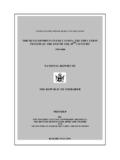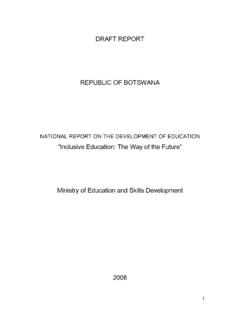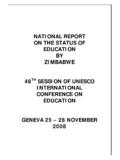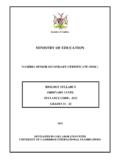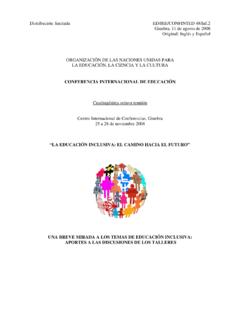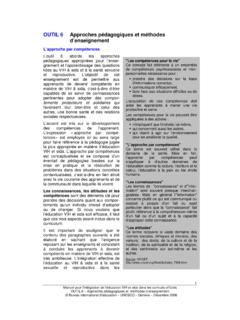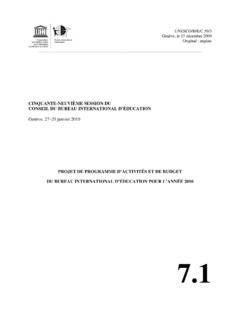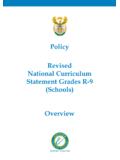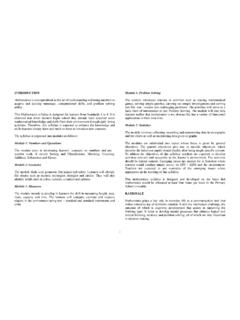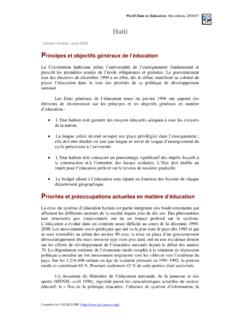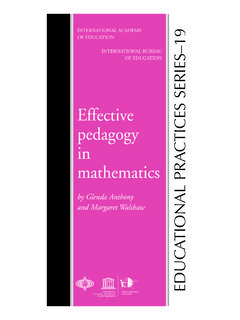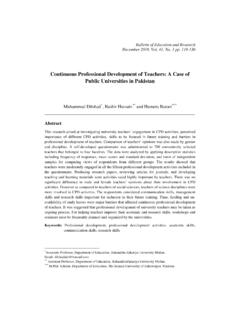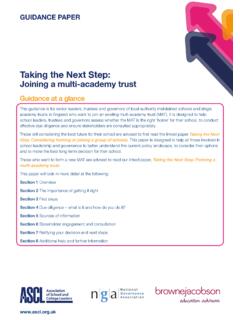Transcription of Effective pedagogy in social sciences
1 INTERNATIONAL ACADEMYOF EDUCATIONINTERNATIONAL BUREAUOF EDUCATIONE ffectivepedagogyin socialsciencesby Claire Sinnemaand Graeme AitkenEDUCATIONAL PRACTICES SERIES 23 BIE educational Practices Series 23:Mise en page 1 31/05/12 13:50 The International Academyof EducationThe International academy of Education (IAE) is a not-for-profitscientific association that promotes educational research, and itsdissemination and implementation. Founded in 1986, the academy isdedicated to strengthening the contributions of research, solving criticaleducational problems throughout the world, and providing bettercommunication among policy-makers, researchers and seat of the academy is at the Royal academy of Science,Literature and Arts in Brussels, Belgium, and its co-ordinating centre isat Curtin University of Technology in Perth, general aim of the IAE is to foster scholarly excellence in allfields of education.
2 Towards this end, the academy provides timelysyntheses of research-based evidence of international importance. TheAcademy also provides critiques of research and of its evidentiary basisand its application to current members of the Board of Directors of the academy are: Monique Boekaerts, University of Leiden, The Netherlands(President) Maria de Ibarrola, National Polytechnical Institute, Mexico(President-elect) Barry Fraser, Curtin University of Technology, Australia (ExecutiveDirector) Adrienne Alton-Lee, Ministry of Education, New Zealand Stella Vosniadou, National and Kapodistrian University of Athens,Greece Douglas Willms, University of New Brunswick, Canada Yong Zhao, Michigan State University, United States of AmericaThe current members of the Editorial Board of the EducationalPractices Series are: Stella Vosniadou, National and Kapodistrian University of Athens,Greece, Chair Erno Lehtinen, University of Turku, Finland Lauren Resnick, University of Pittsburgh, United States of America Gavriel Salomon, University of Haifa, Israel Herbert Walberg, United States of America Erik De Corte, University of Leuven, Belgium, Liaison with IBE Patrick Griffin, University of Melbourne, Australia, Liaison with theAcademy s educational Policy SeriesFor more information, see the IAE s websi te at: educational Practices Series 23:Mise en page 1 31/05/12 13:50 Series PrefaceThe booklet about Effective pedagogy in the social sciences has beenprepared for inclusion in the educational Practices Series by ClaireSinnema and Graeme Aitken.
3 The educational Practices Series isdeveloped by the International academy of Education and distributedby the International Bureau of Education and the academy . As partof its mission, the academy provides timely syntheses of research oneducational topics of international importance. This is the twenty-third in a series of booklets on educational practices to contents of the present booklet are based on a synthesis ofresearch evidence produced for the New Zealand Ministry ofEducation s Iterative Best Evidence Synthesis (BES) programme underthe title Effective pedagogy in social sciences /tikanga iwi bestevidence synthesis iteration (BES) . The synthesis is electronicallyavailable at: Effective pedagogy in social sciences /tikanga iwi is an analysisof 383 studies of social sciences teaching that led to improvedoutcomes for diverse students from early childhood through to seniorsecondary education.
4 Associate Professor Graeme Aitken and DrClaire Sinnema were the lead writers. Associate Professor GraemeAitken is Dean of Education at The University of Auckland. Dr ClaireSinnema is a senior lecturer in the Faculty of Education at TheUniversity of Auckland. The late Professor Jere Brophy, and ProfessorsJanet Alleman, Keith Barton and Erik De Corte provided valuedadvice on this research or guidelines for practice must be responsive to theeducational and cultural context in which they are applied, and theymust be open to continuing evaluation. The inquiry model presentedin this summary provides a tool to help teachers and teacher educatorsadapt and build upon the findings of this synthesis in their of the Editorial Boardof the educational Practices Series3 BIE educational Practices Series 23:Mise en page 1 31/05/12 13:50 Previous titles in the educational practices series:1. Teaching by Jere Brophy.
5 36 Parents and learningby Sam Redding. 36 Effective educational practicesby Herbert J. Walberg and Susan J. Paik. 24 Improving student achievement in mathematicsby Douglas A. Grouws andKristin J. Cebulla. 48 Tutoring by Keith Topping. 36 Teaching additional languages by Elliot L. Judd, Lihua Tan and HerbertJ. Walberg. 24 How children learnby Stella Vosniadou. 32 Preventing behaviour problems: What works by Sharon L. Foster, PatriciaBrennan, Anthony Biglan, Linna Wang and Suad al-Ghaith. 30 Preventing HIV/AIDS in schools by Inon I. Schenker and Jenny M. Motivation to learn by Monique Boekaerts. 28 Academic and social emotional learning by Maurice J. Elias. 31 Teaching reading by Elizabeth S. Pang, Angaluki Muaka, ElizabethB. Bernhardt and Michael L. Kamil. 23 Promoting pre-school language by John Lybolt and Catherine Gottfred. 27 Teaching speaking, listening and writingby Trudy Wallace, Winifred E.
6 Starihaand Herbert J. Using new media by Clara Chung-wai Shih and David E. Weekly. 23 Creating a safe and welcoming school by John E. Teaching science by John R. Teacher professional learning and development by Helen Effective pedagogy in mathematics by Glenda Anthony and Margaret Teaching other languages by Elizabeth B. Principles of instruction by Barak Teaching fractions by Lisa Fazio and Robert titles can be downloaded from the websites of the IEA( ) or of the IBE ( ) or paper copies can be requested from: IBE,Publications Unit, Box 199, 1211 Geneva 20, note that several titles are now out of print, but can bedownloaded from the IEA and IBE educational Practices Series 23:Mise en page 1 31/05/12 13:50 Table of ContentsThe International academy of Education (IAE), page 2 Series preface, page 3 Introduction, page 6 This booklet, page 81. Alignment Identify prior knowledge, page 92.
7 Alignment Align teaching to desired outcomes, page 103. Alignment Provide opportunities to revisit learning, page 124. Connection Draw on relevant content, page 135. Connection Ensure inclusive content, page 146. Community Establish productive learning relationships, page 157. Community Promote dialogue, page 168. Community Share power with students, page 189. Interest Maximize student interest, page 2010. Interest Satisfy diverse motivational needs, page 2211. Interest Use a variety of activities, page 2312. Teaching as inquiry, page 24 Conclusion, page 27 References, page 28 Printed in 2012 by Gonnet Imprimeur, 01300 Belley, publication was produced in 2012 by the InternationalAcademy of Education (IAE), Palais des Acad mies, 1, rueDucale, 1000 Brussels, Belgium, and the International Bureau ofEducation (IBE), Box 199, 1211 Geneva 20, Switzerland. Itis available free of charge and may be freely reproduced andtranslated into other languages.
8 Please send a copy of anypublication that reproduces this text in whole or in part to theIAE and the IBE. This publication is also available on theInternet. See the Publications section, educational PracticesSeries page at: authors are responsible for the choice and presentation of thefacts contained in this publication and for the opinions expressedtherein, which are not necessarily those of UNESCO/IBE and donot commit the organization. The designations employed and thepresentation of the material in this publication do not imply theexpression of any opinion whatsoever on the part ofUNESCO/IBE concerning the legal status of any country,territory, city or area, or of its authorities, or concerning thedelimitation of its frontiers or educational Practices Series 23:Mise en page 1 31/05/12 13:50 IntroductionThis booklet is a synthesis of research on social sciences teaching thathas been shown to have a positive effect on a range of desirablestudent outcomes: cognitive, skills, participatory and affectiveoutcomes.
9 Education in the social sciences plays an important role indeveloping students sense of identity and influencing the ways inwhich they understand, participate in and contribute to local,national and global twelve principles of Effective pedagogy highlighted in thisbooklet are organized around five major findings from the evidenceconcerning Effective teaching in the social sciences (including socialstudies, history, geography, economics, classical studies and othersocial sciences ). The first four findings are that alignment, connection,community and interest offer broad explanations for how teachingcan support the achievement of valued outcomes for students. While6 BIE educational Practices Series 23:Mise en page 1 31/05/12 13:50 these findings are associated with principles of Effective teachinggenerally, their particular usefulness arises from their origin in thesource articles drawn from the social sciences .
10 Teacher contentknowledge in specific social sciences is critical to success, but the focusof this summary is on the how of Effective teaching across the fifth finding teaching as inquiry concerns a model ofinquiry that can help teachers apply research-based strategies in waysthat are responsive to their own diverse groups of learners. The modelis also important because it can mitigate against the risk that (as hasbeen found) teaching practices may have unintended negative effectson educational Practices Series 23:Mise en page 1 31/05/12 13:50 This bookletThis booklet is primarily for those who are involved in teaching andlearning in the social sciences , but it should also be useful for anyonewho is interested in helping students to learn. For those who wantmore, the best-evidence synthesis on which it is based providesexamples, vignettes and cases of Effective teaching that bring theprinciples to life in social sciences subjects.
